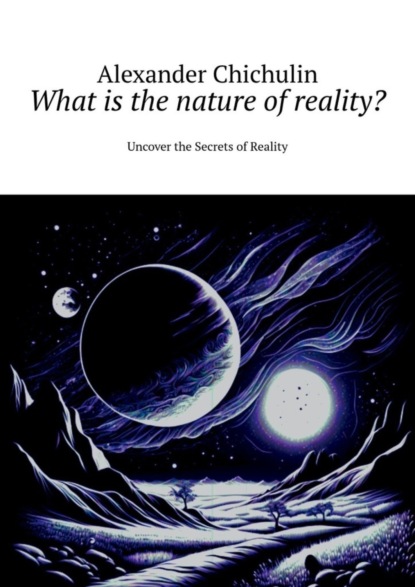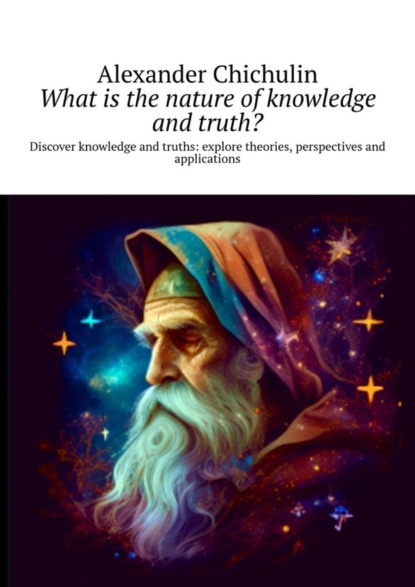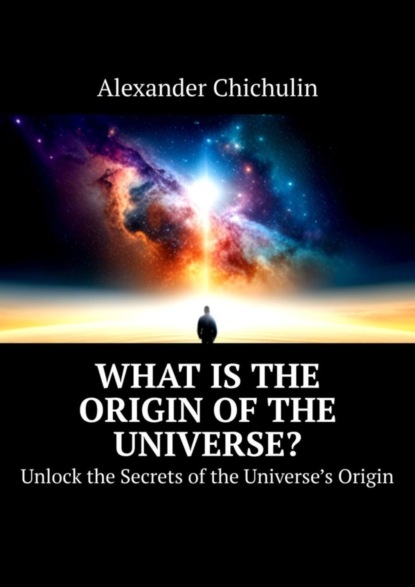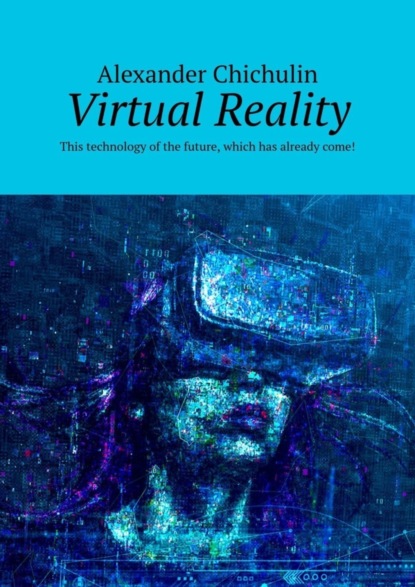
Полная версия:
Alexander Chichulin What is the nature of reality? Uncover the Secrets of Reality
- + Увеличить шрифт
- - Уменьшить шрифт

What is the nature of reality?
Uncover the Secrets of Reality
Alexander Chichulin
© Alexander Chichulin, 2023
ISBN 978-5-0059-9845-3
Created with Ridero smart publishing system
1. Introduction
The question of what is real, and how we can know what is real, has puzzled humanity for centuries. In today’s world, where information is readily available and constantly changing, the search for truth and understanding is more important than ever. This book explores the nature of reality from a variety of perspectives, drawing on philosophy, science, religion, and spirituality. By examining different conceptions of reality and their implications, we can gain a deeper understanding of ourselves, our world, and our place in it. Through careful analysis and reflection, we hope to shed light on one of the most fundamental questions of human existence.
– The search for truth
The search for truth has been a central quest for humanity throughout history. It is a quest that has driven individuals and societies to seek out knowledge, understanding, and enlightenment. From the earliest days of civilization, people have grappled with questions about the nature of reality and the meaning of existence. These questions have inspired philosophers, scientists, and spiritual leaders to develop theories, methods, and practices that help us to understand the world around us.
The search for truth has taken many forms throughout history. In ancient times, truth was often believed to reside in the realm of the gods, and religious texts and rituals were used to access this divine knowledge. As human societies developed and scientific inquiry began to emerge, truth became increasingly associated with empirical evidence and the scientific method. Today, truth is often seen as a combination of these approaches, as well as personal experience and intuition.
Despite our best efforts, the search for truth is an ongoing and often elusive pursuit. Our understanding of reality is constantly evolving, and new discoveries and insights challenge our assumptions and beliefs. Yet the search for truth remains a vital and necessary endeavor. It helps us to make sense of the world, to develop new technologies and medicines, and to build better societies. Ultimately, the search for truth can help us to live more meaningful, fulfilling lives.
– Why study the nature of reality?
Why study the nature of reality? The answer to this question is multi-faceted, and depends on the perspective of the individual or group asking it. Here are a few reasons why studying the nature of reality is important:
1. To understand ourselves: Our understanding of reality shapes our perception of the world, and thus our sense of self. By examining different conceptions of reality, we can gain insight into our own beliefs, assumptions, and biases. This self-awareness can help us to become more empathetic, open-minded, and adaptable.
2. To understand the world: Our understanding of reality also shapes how we interact with the world around us. By studying the nature of reality, we can gain a deeper understanding of the natural world, the social world, and the spiritual world. This understanding can help us to develop new technologies, create more just and equitable societies, and connect with others in more meaningful ways.
3. To make sense of our experiences: Human experience is complex and often contradictory. By studying the nature of reality, we can develop frameworks for understanding and interpreting our experiences. This can help us to make sense of the world, to find meaning and purpose in our lives, and to navigate the challenges and uncertainties that we encounter.
4. To contribute to human knowledge: Finally, studying the nature of reality is a way to contribute to the collective knowledge of humanity. By asking questions, exploring new ideas, and sharing our insights, we can help to advance our understanding of reality and make meaningful contributions to society.
2. Historical Perspectives
The question of what is real and how we can know what is real has been a subject of inquiry for humanity since ancient times. In this section, we will explore some of the historical perspectives on the nature of reality.
2.1 Ancient Conceptions of Reality
In ancient times, reality was often seen as a product of divine creation or intervention. Many cultures believed that the gods were responsible for creating the world and everything in it. In some cases, these gods were seen as being in direct control of the natural world, while in others, they were believed to have created the world and then withdrawn from it. In either case, the divine was seen as the ultimate source of truth and knowledge.
Over time, philosophers began to question these traditional beliefs and developed new ideas about the nature of reality. For example, in ancient Greece, philosophers such as Thales and Democritus developed theories about the fundamental nature of matter and the structure of the universe. These early ideas laid the foundation for later scientific inquiry and helped to shape our modern understanding of reality.
2.2 The Scientific Revolution and Its Impact on Our Understanding of Reality
In the 16th and 17th centuries, a revolution in scientific thinking took place that had a profound impact on our understanding of reality. The scientific method, which involves systematic observation, experimentation, and the testing of hypotheses, became the dominant approach to understanding the natural world. This led to significant advances in fields such as physics, astronomy, and biology.
One of the key figures of this period was Sir Isaac Newton, whose laws of motion and theory of gravity provided a unified explanation for many of the phenomena that had previously been seen as separate and unconnected. Newton’s work laid the foundation for classical mechanics and helped to establish the idea that the universe operates according to consistent, predictable laws.
2.3 The Rise of Relativism and Postmodernism
In the 20th century, new ideas about the nature of reality began to emerge that challenged traditional views. Relativism, for example, suggests that reality is not objective or absolute, but rather depends on the observer’s perspective. This idea has been influential in fields such as anthropology and sociology, where cultural differences are seen as playing a major role in shaping perceptions of reality.
Postmodernism takes this idea even further, suggesting that reality itself is a social construct that is constantly being created and re-created through language, culture, and power relations. According to this view, there is no objective truth or reality, but rather a multiplicity of perspectives and interpretations.
These are just a few examples of the historical perspectives on the nature of reality. By examining these different perspectives, we can gain insight into the ways that our understanding of reality has evolved over time, and the ways that it continues to shape our beliefs and behaviors.
– Ancient conceptions of reality
In ancient times, people often looked to the divine for answers about the nature of reality. Many cultures believed that the gods or other supernatural forces were responsible for creating the world and everything in it. These beliefs were often expressed in myths and legends that told stories about the origins of the universe and the forces that govern it.
For example, in ancient Egypt, the god Atum was believed to have created the world by speaking it into existence. In Hinduism, the god Brahma was seen as the creator of the universe, while in Norse mythology, the god Odin and his brothers were said to have shaped the world out of the body of the giant Ymir.
In addition to these creation myths, many ancient cultures developed elaborate systems of religious belief and practice that sought to explain the workings of the universe and the place of humans within it. These systems often involved sacrifices, rituals, and other forms of worship designed to placate the gods and gain their favor.
At the same time, some ancient philosophers began to question these traditional beliefs and develop new ideas about the nature of reality. For example, in ancient Greece, philosophers such as Thales and Democritus developed theories about the fundamental nature of matter and the structure of the universe. These early ideas laid the foundation for later scientific inquiry and helped to shape our modern understanding of reality.
Overall, ancient conceptions of reality were shaped by a combination of religious belief, mythological storytelling, and philosophical inquiry. While these beliefs and ideas have evolved over time, they continue to influence our understanding of the world around us today.
– The Scientific Revolution and its impact on our understanding of reality
The scientific revolution of the 16th and 17th centuries marked a major turning point in human history and had a profound impact on our understanding of reality. Prior to this period, most people believed that the world was shaped by divine intervention and that the natural world operated according to mysterious and unpredictable forces.
During the scientific revolution, however, a new approach to understanding the world emerged, based on systematic observation, experimentation, and the testing of hypotheses. This approach, known as the scientific method, enabled scientists to make significant advances in fields such as physics, astronomy, and biology.
One of the key figures of this period was Sir Isaac Newton, whose laws of motion and theory of gravity provided a unified explanation for many of the phenomena that had previously been seen as separate and unconnected. Newton’s work laid the foundation for classical mechanics and helped to establish the idea that the universe operates according to consistent, predictable laws.
The scientific revolution also had a profound impact on our understanding of the human body and mind. For example, the work of Andreas Vesalius, who conducted detailed dissections of the human body, helped to establish the field of modern anatomy. Similarly, the work of Rene Descartes, who argued that the mind and body are separate but interacting entities, helped to lay the foundation for modern neuroscience.
Overall, the scientific revolution marked a major shift in the way that people approached questions about the nature of reality. Rather than relying on tradition or divine authority, scientists began to use reason and empirical observation to uncover the secrets of the natural world. This approach has continued to shape our understanding of reality in the centuries since, and remains a powerful tool for advancing human knowledge and understanding.
– The rise of relativism and postmodernism
In the latter half of the 20th century, a new set of ideas emerged that challenged many of the assumptions of modern science and philosophy. Known as relativism and postmodernism, these ideas emphasized the subjectivity of human experience and questioned the existence of objective truths.
Relativism is the idea that truth is relative to the individual or culture that holds it. In other words, what is true for one person or group may not be true for another. This idea can be seen as a reaction against the idea of universal truths that emerged during the scientific revolution.
Postmodernism, on the other hand, is a broader cultural movement that emphasizes the importance of context and the idea that reality is constructed through language and discourse. According to postmodernists, there is no objective reality that exists independently of human perception and interpretation.
Конец ознакомительного фрагмента.
Текст предоставлен ООО «ЛитРес».
Прочитайте эту книгу целиком, купив полную легальную версию на ЛитРес.
Безопасно оплатить книгу можно банковской картой Visa, MasterCard, Maestro, со счета мобильного телефона, с платежного терминала, в салоне МТС или Связной, через PayPal, WebMoney, Яндекс.Деньги, QIWI Кошелек, бонусными картами или другим удобным Вам способом.





